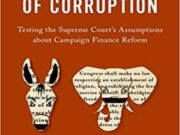It has become a hallmark of election season chatter to read stories about money “flooding into politics” in various media outlets. Usually, these discussions devolve into paranoid fantasies of billionaires secretly pulling the strings of government and deciding elections singlehandedly with their wealth.
CCP has long noted that actual studies of the effects of money in politics do not support the hyperbolic claims propagated by so-called “reformers” and repeated uncritically in the media. In the words of CCP Academic Advisor and University of Missouri Professor Jeff Milyo, “There is something of a scholarly consensus … stand[ing] in stark contrast to the popular wisdom so often echoed by pundits, politicians, and reform advocates that elections are essentially for sale to the highest bidder (spender). Decades of social science research consistently reveal a far more limited role for campaign spending.”
A new analysis from Yahoo Finance further buoys existing social science research on this topic:
“With so much concern about democracy for sale, Yahoo Finance set out to ask a basic question: Are rich donors buying election results? We scrutinized thousands of federal records on campaign donations in presidential and congressional campaigns in 2012 and 2014, and came up with this simple answer: no. Among our findings:
* Wealthy donors of both parties often back losing candidates, partly because they align themselves with strident left- or right-wingers who have a hard time winning over mainstream voters.
* In many races, there’s a huge amount of money on both sides, with big donors essentially canceling each other out.
* Contrary to conventional wisdom, liberal spending groups have backed a higher percentage of winning candidates during the last two election cycles than conservative groups, perhaps because Democratic President Barack Obama won the White House in 2012, contributing to other Democratic victories.
* Much of the money flooding into politics is spent on political ads that aren’t that effective and sometimes have no discernible effect.
* External factors such as the economy or national political trends are still far more decisive in federal elections than campaign donations.”
To those of us at CCP and elsewhere advocating for the First Amendment, these findings make sense because we have been educating citizens about this myth for years.
But not only does Yahoo’s analysis reinforce our understanding of how money does and doesn’t help candidates, it also helps to explain why most self-funded candidates fail. Although many would expect a self-funded candidate to benefit in the eyes of voters as a result of their financial independence, self-funders are often self-funders because they couldn’t persuade many citizens to support their campaign. Whether it was Steve Forbes, Meg Whitman, or Linda McMahon, history teaches us that having the money to run a campaign does not mean that the campaign will be successful. What this boils down to is the simple fact that money alone does not determine the outcome of an election – voters do.
This tenant rings true for candidates of all stripes, Democrat or Republican, conventionally funded or self-funded. The main lesson to take away from Yahoo’s findings is that while money can help a candidate (or a Super PAC independently supporting a candidate) purchase a resource, advertise, or otherwise disseminate a candidate’s message, the amount of money a candidate has or spends does not determine how many votes they will receive.
As Yahoo’s analysis demonstrates, garnering a significant war chest for a campaign does not directly correlate to winning an election. Rather, candidates need to be a jack of all trades. They need to present a persuasive message, possess a likable personality, and display an ability to connect with diverse groups of voters. Successful candidates must have the knowledge, experience, and background for the job they seek. These and numerous other factors combine to help candidates raise the funds necessary to mount a serious campaign. Taken together, these dynamics – and not money alone – can and will either make or break a candidate.
Fortunately, Yahoo’s report reiterates what CCP and many others have been saying all along. The question, as ever, remains whether self-styled “reformers” will modify their proposals for even more expansive regulation of political speech to conform to this reality or will continue to shout at the wind.














